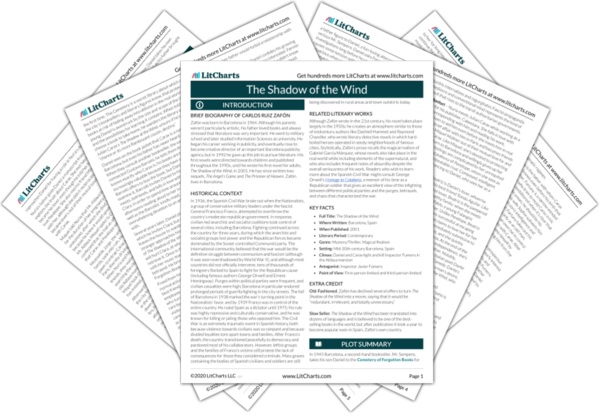As a child, Daniel becomes fascinated by a fountain pen said to have to belonged to Victor Hugo, which Mr. Sempere eventually buys for him. Later, he finds out that in fact Nuria found the pen in Paris and bought it for Carax, her lover at the time. The fountain pen demonstrates Daniel and his father’s unconventional but enduring relationship. Mr. Sempere’s initial inability to afford it shows that for him fatherhood isn’t defined by wealth or power, as it is for many of the novel’s other men. His purchase of the pen years after Daniel’s initial interest shows a kindness and thoughtfulness that fathers like Fortuny, Mr. Aguilar, or Mr. Aldaya never possess. The gift also shows that Mr. Sempere values and supports his son’s creative eccentricities, while other fathers view these things as signs of weakness or femininity in their sons. It’s important to note that while Daniel sometimes chafes at his family’s humble life or searches out more worldly father figures, he’s ultimately very loyal to his father; he never reproaches him for not being able to buy the pen, and years later the gift draws them together after a quarrel. The pen is thus an endorsement of Mr. Sempere’s brand of fatherhood.
The pen also forms a link between Daniel and one of his other father figures, Carax. On one level, their mutual fascination with the pen shows how invested they both are in the world and history of literature, a character trait that makes them very similar. Moreover, the fact that they were both drawn to it in pawnshops in separate cities shows that the likeness between them and the coincidences that draw them together are too manifold to be random. Even after Daniel puts an end to the similarities between him and Carax by killing Fumero, thus extricating himself from Carax’s tragic narrative, Carax appears mysteriously in the hospital and Daniel gives him the fountain pen as a sign of friendship. Years later, Carax sends Daniel his new novel with an inscription written in the fountain pen. Even as Daniel is settled in a highly realistic adulthood, the fountain pen reemerges as a symbol of the Gothic intrigue and sense of fate that dominated his adolescence.
The Fountain Pen Quotes in The Shadow of the Wind
I can’t remember his exact words, or the sound of his voice. I do know that he held my hand and I felt as if he were asking me to live for him, telling me I would never see him again. What I have not forgotten is what I told him. I told him to take that pen, which had always been his, and write again.

Unlock explanations and citation info for this and every other The Shadow of the Wind quote.
Plus so much more...
Get LitCharts A+









